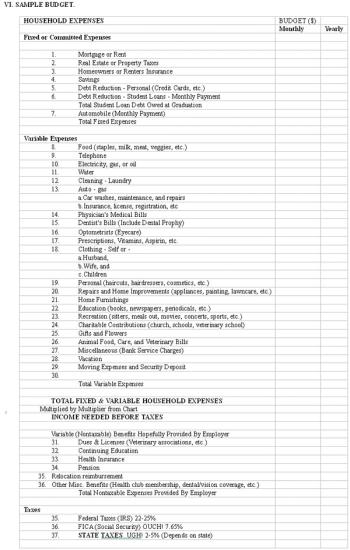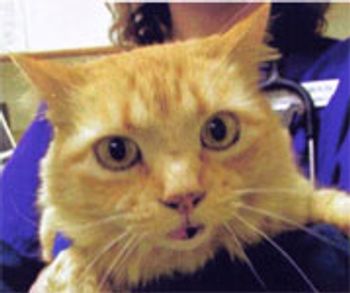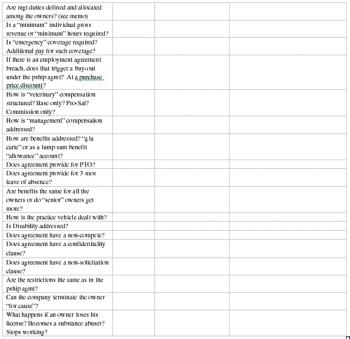
Trend #1: The Recession, chapter 1 of a four-part web presentation by Dr. Karen Felsted, CEO of the National Commission on Veterinary Economic issues.

Trend #1: The Recession, chapter 1 of a four-part web presentation by Dr. Karen Felsted, CEO of the National Commission on Veterinary Economic issues.

Take stock of what you have now as you build your budget for 2011.

Washington -- Veterinarians may now be in the clear, free from falling under requirements set by the Federal Trade Commission?s (FTC) Red Flag?s Rule.

Have you ever considered employing your child? Doing so might save you money in the long run.

Build goodwill and the bottom line at your veterinary practice by sharpening up your aquatic animal skills.

I just finished organizing all of my miscellaneous old car parts.

Failing to charge, or not charging appropriately, will put you and your practice in the poor house.

Improve productivity by focusing on your core responsibilities and delegating duties to your veterinary hospital staff

In-home blood glucose monitoring can improve prognoses and client compliance at your veterinary practice.

You're ready to hand over the practice you've nurtured throughout your veterinary career. Use these tips to help you line up the right successor, the right time frame, and the right price.

A new look at investing and saving levels finds Americans' retirement funds won't carry them through.

Here are three ways to give without hurting your practice.

Exit strategy or practice succession planning can include every aspect from financial planning for retirement to where will I find a buyer. This retirement financial aspect would include planning for the future practice sale value. That is another session not covered in this topic.

High turnover among veterinary associates is caused principally by the failure of practice owners and employees to properly articulate their respective expectations and negotiate and document the employment relationship. Time and effort invested up front will help avoid mismatched expectations, misunderstandings and separation down the road.

Before you schedule the cherry picker to come to your practice, let's see if we can fill your basket with some of the "low hanging" fruit.

Results of Benchmarks 2010: A Study of Well-Managed PracticesSM by Wutchiett Tumblin and Associates and Veterinary Economics reveal that a current partner, or a current or future associate is the most likely buyer in 69 percent of practices. And, one of the most important steps to take to prepare an associate for ownership is teaching them about and involving them in the business side of practice.

A buy-sell agreement or shareholder's agreement or operating agreement is a written statement of plans about how owners can slow down or get out of the practice at a set time or occurrence. It is the shareholder's agreement for a corporation or an operating agreement for an LLC.

Small changes in how you practice, or in how you run your business, can have a dramatic impact on your earnings over a lifetime and in keeping you and the profession economically strong.

A lower risk practice purchase means the buyer and seller both win and the practice sells. It may be obvious that win-win is best, but sales are made that are not win-win or low risk. The practice sale may be to an independent third party or to an inside person, usually an associate doctor.

Buying or selling a veterinary practice generally is a long and arduous process. Preparation and a good lawyer are key to smoothing the bumps along the way.

The time for a practice sale depends on the following items: timing, personal health, interest in work, motivation for work, age, stress, funds, alternative investments and alternative activities. Some say you need 15-20 times your current earnings in investment funds for retirement.

Co-ownership issues often arise when veterinary practitioners enter into a partnership with other owners, or when two or more associates jointly venture into practice acquisition. In most aspects co-ownership of a veterinary practice is akin to marriage, and it is vitally important to agree on the principal terms governing the relationship before getting hitched.

Non-DVM practice ownership has long been the standard in most states. This is because the practice acts require it in slightly more than half the states. The remainder of the states may or may not allow non-veterinary ownership of a veterinary practice, but do not directly address the issue in their practice acts.

Uncover new tax provisions that could save your veterinary practice money -- and help you afford that new equipment you've been eyeing.

Try these tactics to turn your anxious shaking about the economy to jumps for joy.

Hanging with Hafen: It's easy being green?and lean

Find ways to generate revenue to get your practice back on track financially.

Uncle Sam has a new hassle for tax reporting for veterinarians who own rental property.

Wayne Usiak, AIA, founder of BDA Architecture in Albuquerque, N.M., shares his insights into the state of exam room design and functionality.

Creative use of space in the veterinary clinic makes money is good for the budget.